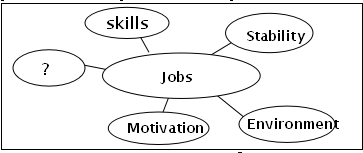题目内容
14.Parents have widely different views on the problem of pocket money.Four new fathers were asked this question and this is how they answered.Ashish Khanna:Although many argue that pocket money helps develop children's sense of value,I don't agree.I wouldn't give my child any pocket money.First of all,I never got pocket money and I seem to have a good value for money.If my child ever needed something and I felt it was a reasonable(合理)request,I would buy it for him.
Sharad Sanghi:No,I wouldn't give my child pocket money because I don't want to create the perception(观念) of"her"money and"my"money.Besides,if I refuse to buy her something that I think is bad for her,she may buy it with her pocket money on the sly.In this way,I would lose control over my child's requests.I feel it also encourages children to care more about money than anything else.I don't want my child to start judging(评判) other children by the amount of money or pocket money they have.
Rakesh Shah:Yes,I would give my child pocket money.I feel that children should learn to spend money intelligently and not go overboard spending.They will learn what their limitations(限制)are and feel the difficulty when they have to pay for something that is over their own pockets.
Rajiv Patel:Yes,I would give my child pocket money because it is important that she learns to manage money.I will give her a fixed amount every month and if she spends the money before the month is over,then she will learn a lesson and not spend money so freely.
Vikram Desai:Yes,I would certainly give my child pocket money.But I would not give it to him on a weekly or monthly basis.He would have to earn it.If he helped me finish some of my jobs or helped his mother with housework,I would reward him.This helps him realize that"money does not grow on trees"and it requires hard work to earn money.
66.Ashish Khanna may agree thatC.
A.he was given too much pocket money when young
B.he can take much control of his child by money
C.he will buy anything he thinks his child really needs
D.pocket money helps children develop a good value for money
67.The underlined phrase"on the sly"in Paragraph 3 is closest in meaning to.
A.for free B.at a lower price C.happily D.secretly
68.What do Rakesh Shah and Rajiv Patel have in common?A
A.They want their children to learn to manage money.
B.They ask their children to get pocket money by working.
C.They teach their children the difficulty of making money.
D.They allow their children to spend money freely.
69.According to Vikram Desai,children's earning money by themselves makes them know thatA.
A.money is not easy to get
B.money can be gotten from the trees
C.one can get lots of money if he/she works hard
D.money is not so important for people nowadays
70.Who would give his child pocket money every month?D
A.Ashish Khanna B.Sharad Sanghi C.Rakesh Shah D.Rajiv Patel.
分析 本文是一篇科教类文章,文章主要介绍了几位父亲对于该孩子零用钱的不同态度和理由,Ashish Khanna不会给孩子零花钱,当孩子有合理要求时,他会买给孩子;Sharad Sanghi我不会给我的孩子零花钱,因为我不想创建"她"的钱,"我"的钱的观念;Rakesh Shah会给孩子零花钱,让孩子学会明智地花钱,不走极端;Vikram Desai会给孩子零花钱,可是我不会定时每周或每月给.
解答 66.答案:C.细节理解题.根据第二段最后一句"If my child ever needed something and I felt it was a reasonable(合理)request,I would buy it for him"可知,如果我认为孩子所需要的东西是合理的,我会买给他.故选C.
67.答案:D.推理判断题.根据本句"if I refuse to buy her something that I think is bad for her,she may buy it with her pocket money on the sly"可知,如果我不买给他,他会用自己的零用钱偷买,故on the sly指偷偷地.故选D.
68.答案:A.细节理解题.根据第四段第二句"I feel that children should learn to spend money intelligently"和第五段第一句"I would give my child pocket money because it is important that she learns to manage money"可知,他们的共同点是想要让孩子学会理财.故选A.
69.答案:A.细节理解题.根据最后一段最后一句"This helps him realize that"money does not grow on trees"and it requires hard work to earn money."可知,这帮助孩子意识到挣钱不容易.故选A.
70.答案:D.细节理解题.根据倒数第二段第二行"I will give her a fixed amount every month"可知,Rajiv Peter每周给他的孩子零花钱.故选D.
点评 本文是一篇科教类文章,题目涉及多道细节理解题,推理判断题,做题时应结合文章上下文内容并根据所给选项的含义进行分析,从而得出正确答案.切记胡乱猜测,一定要做到有理有据.

| A. | considered | B. | willing | C. | supposed | D. | allowed |
| A. | none | B. | no one | C. | neither | D. | nothing |
| A. | -fantastic | B. | brave | C. | smart | D. | violent |
| A. | normal | B. | ordinary | C. | common | D. | typical |
| A. | burst | B. | finish | C. | identify | D. | achieve |
